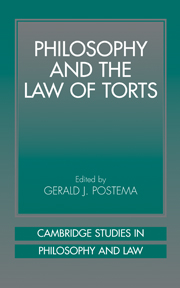Book contents
- Frontmatter
- Contents
- Contributors
- 1 Introduction: Search for an Explanatory Theory of Torts
- 2 A Social Contract Conception of the Tort Law of Accidents
- 3 Responsibility for Outcomes, Risk, and the Law of Torts
- 4 The Significance of Doing and Suffering
- 5 Tort Law and Tort Theory: Preliminary Reflections on Method
- 6 Corrective Justice in an Age of Mass Torts
- 7 Economics, Moral Philosophy, and the Positive Analysis of Tort Law
- 8 Pluralism in Tort and Accident Law: Towards a Reasonable Accommodation
- References
- Index
1 - Introduction: Search for an Explanatory Theory of Torts
Published online by Cambridge University Press: 01 July 2009
- Frontmatter
- Contents
- Contributors
- 1 Introduction: Search for an Explanatory Theory of Torts
- 2 A Social Contract Conception of the Tort Law of Accidents
- 3 Responsibility for Outcomes, Risk, and the Law of Torts
- 4 The Significance of Doing and Suffering
- 5 Tort Law and Tort Theory: Preliminary Reflections on Method
- 6 Corrective Justice in an Age of Mass Torts
- 7 Economics, Moral Philosophy, and the Positive Analysis of Tort Law
- 8 Pluralism in Tort and Accident Law: Towards a Reasonable Accommodation
- References
- Index
Summary
To an old-fashioned English lawyer, Sir Thomas Holland once said, common law is “a chaos with a full index” (Holmes 1870, p. 114). Anglo-American tort law, having evolved case by particular case, retains the common law character of its origins more than any other department of law. It is likely to strike a reader of any standard casebook to be little more than indexed chaos. Yet, at least since Holmes in the early twentieth century jurists and legal scholars have sought to identify some unifying and rationalizing themes or aims. Only lately, in the last generation or so, have philosophers signed on to this project as well. Over the past decade especially the philosophical contribution to this project has become increasingly sophisticated. As one might expect, this increased attention and sophistication has led on the whole to greater refinement of theoretical options rather than to increasing consensus with regard to one of those options. The essays commissioned for this book take theoretical reflection on the foundations of tort law in new directions. Each voice is distinctive, and there is a considerable degree of disagreement among the contributors on some key issues, but there is also more than a little agreement about the object of theoretical reflection and, in broad strokes, the appropriate methodology directing this reflection.
The primary aim of these essays is not critical or justificatory; rather they seek to contribute to the articulation and defense of an explanatory account of tort law.
- Type
- Chapter
- Information
- Philosophy and the Law of Torts , pp. 1 - 21Publisher: Cambridge University PressPrint publication year: 2001
- 1
- Cited by

